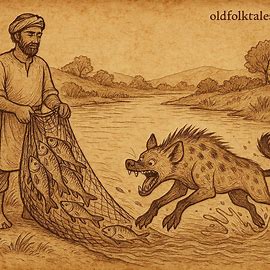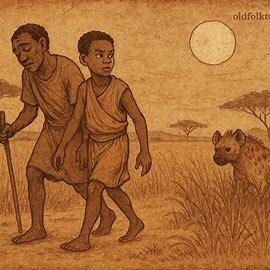Dinianga dia Ngombe rose one morning, took up his gun, and declared firmly, “I will go hunting today.” With steady steps, he journeyed into the bush, the forest alive with rustling leaves and the hum of hidden creatures. Soon, he spotted a Deer quietly feeding on mudia-mbambi, a plant it loved. Carefully, the hunter prepared a seat high in a tree, marking the perfect place from which to strike. Satisfied with his plan, he returned home to await the right hour, the hour when Deer would return to feed again.
When the time came, Dinianga lifted his gun once more and set off for the tree-seat. He climbed up, settled himself, and waited in silence. The air was heavy with expectation, broken only by the distant calls of birds. At last, Deer approached, unsuspecting, to nibble at the plants.
With practiced hands, Dinianga raised his gun, cocked it, and fired. The shot rang through the forest, and Deer collapsed onto the ground. Quickly descending from his perch, the hunter seized Deer by the leg and finished the work with his hatchet. Certain that his prey was dead, he drew his knife from his waist and began flaying the animal.
READ THIS: The Child of Hunter and the Child of Deer | A Kimbundu Folktale
Patiently, he peeled away the hide, tugging it free from the warm body. But then came a moment unlike any he had ever seen. As the skin slipped away, Deer suddenly leapt to its feet!
Without its hide, naked and raw, the animal bolted in haste, bounding through the bush until it stopped at a distance, turning to face the hunter. Dinianga remained behind, stunned, the deer’s hide clutched uselessly in his hands.
“What is this strange wonder I have encountered?” he cried. “The deer that I killed has risen and fled, leaving its hide in my grasp!”
From afar, Deer answered boldly: “Shame is yours, Nianga, just as shame is mine. When I return to my father and mother, they will ask me, ‘Why do you come naked? Where is your skin?’ And I will bear shame. But you too, when you return to your people and your wife, and tell them, ‘I went hunting. I shot a deer. I skinned it. But it rose and left its hide in my hands,’ you too will be seized by shame.”
Dinianga listened but offered no reply. Quietly, he picked up his gun and turned toward home. When he arrived, he told his people and his wife, “I have seen an ominous wonder. I shot a deer; it died. I skinned it. Then it rose and ran, leaving me only the hide.”
At this, his family and neighbours laughed at him. The hunter who had gone out in confidence returned with nothing but disgrace.
Thus, Deer triumphed, and Nianga lost.
Moral Lesson
This folktale reminds us that victory does not always belong to strength or skill alone. Even the most confident hunter may be undone by forces he cannot control, while the prey he thought defeated may yet turn his triumph into shame. It warns us that pride in success can quickly give way to humiliation, and that life holds mysteries beyond human power.
The tale also teaches that shame is not borne by one alone but can fall on all sides on the victor and the vanquished alike reminding us that in every contest, honour and disgrace walk hand in hand.
Knowledge Check
Q1: Who was Dinianga dia Ngombe in the story?
A1: He was the hunter who went into the bush to kill Deer.
Q2: What plant was Deer eating when the hunter first saw him?
A2: Deer was eating mudia-mbambi, a plant it favored.
Q3: What unusual event shocked the hunter after he skinned Deer?
A3: Deer stood up alive, leaving its hide behind, and ran away.
Q4: How did Deer respond to the hunter’s astonishment?
A4: Deer told him that both would face shame, Deer before its parents, and the hunter before his people.
Q5: How did the hunter’s family react to his tale?
A5: They laughed at him, mocking his strange failure.
Q6: What is the cultural origin of this folktale?
A6: It is a Kimbundu folktale from Angola.
Source
Kimbundu folktale, Angola.
(From Folktales of Angola, collected by Heli Chatelain, Smithsonian Digital Library)







